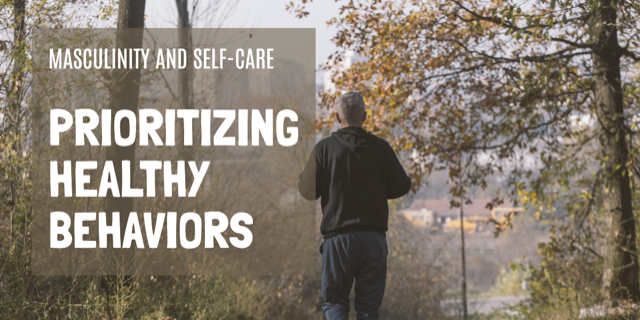The Cleveland Clinic has surveyed about 1000 US men every year over the last six years. The survey asks about healthy behaviors, or how they take care of themselves. The answers are fairly consistent.
In that same survey, 77 percent of married men (or those in a domestic relationship) said that they would rather go shopping with their significant other than go to the doctor.
Does this sound familiar?
In the 2023 survey, even though 81 percent said that they are living a healthy lifestyle, their answers to other questions revealed a disconnect.
- 83% have experienced stress in the last six months
- 65% said they hesitate seeking professional mental health care for stress, anxiety, and depression
- 37% experienced sexual health issues
- 13% smoke
- 54% were not satisfied with their current weight
- 83% of men do not use sunscreen on daily basis
So what’s going on?
There is a difference in the survival statistics of men and women. Men die earlier than women, and are sicker, earlier, than women. For example, almost 51 percent of US men 18 and older have high blood pressure while 40 percent of women have hypertension. According to Johns Hopkins Medicine, men develop heart disease earlier than women, by about 10 years. In the US, women live about six years longer than men.
Research has looked at differences in healthy behaviors performed by men versus women. They have found that men are more likely to engage in risky behavior. For example, men are significantly more likely than women to die of overdoses of opioids and other drugs.
These gender differences have instigated research exploring the construct of masculinity, or how men define being a man. In the US, men and boys experience a large amount of social pressure to believe that men are independent, self-reliant, strong, robust, and tough. Even in a recent study of men with an average age of 35, the definition of the five most important masculine norms in U.S. society were 1) emotional toughness, 2) providing for a family, 3) avoidance of femininity, 4) being a gentleman, and 5) work.
Does performing healthy behaviors fit into this perception of manhood?
Have you ever heard a man brag, “I haven’t been to a doctor in years”? Or boast, “I don’t take sick leave from work,” or “I don’t need sleep”? Seeing a physician, staying home and in bed when sick, and getting requisite amounts of sleep are all positive health behaviors. But for some men, these are statements of toughness and strength, self-reliance, working and providing for the family, or definitions of masculinity.
During the COVID pandemic, researchers found a gender difference in performing preventive actions like washing hands, mask wearing, and social distancing. Men were less likely to engage in these disease-preventing measures. In fact, men who reported traditional masculine norms also reported barriers to adopting CDC recommendations, regardless of their political affiliation.
Can men change their perceptions of performing healthy behaviors?
Absolutely.
By reframing: One suggestion to reframe mask wearing and address the perceived barriers to this infection preventing behavior would be to describe mask wearing as a way to stay healthy, be strong, be able to work, and be a good provider.
By prioritizing: Keeping one’s sex life active might also be an important motivator for men. One of the early signs of heart disease in men is erectile dysfunction (ED). Smoking also contributes to ED. By slimming down, being physically active, reducing stress, and not smoking, a man can continue to have an active sex life while lessening his risk of ED.
By increasing awareness: Men are less likely to go to the dentist. If they knew that improved oral health would also improve their overall health, including their heart health (factor for ED: remember?), perhaps they would also take better care of their teeth.
What do you think?
Do men believe that their health matters? Why do you think that men are less likely to go to the doctor, and perform positive health behaviors?
References (in order of use):
Cleveland Clinic. (2019, Sept. 4). Cleveland Clinic Survey: Men will do Almost Anything to Avoid Going to the Doctor. https://newsroom.clevelandclinic.org/2019/09/04/cleveland-clinic-survey-men-will-do-almost-anything-to-avoid-going-to-the-doctor
Cleveland Clinic. (2023, Sept. 6). Cleveland Clinic Survey Examines the Current State of Men’s Health in America. https://newsroom.clevelandclinic.org/2023/09/06/cleveland-clinic-survey-examines-the-current-state-of-mens-health-in-america
Courtenay WH. Constructions of masculinity and their influence on men’s well-being: a theory of gender and health. Soc Sci Med. 2000 May;50(10):1385-401. doi: 10.1016/s0277-9536(99)00390-1. PMID: 10741575.
Wong, Y. J., Granderson, R. M., Zounlome, N. O. O., McCullough, K. M., Hyman, J. E., & Schwabe, S. B. (2020). The assessment of subjective masculine norms in the United States. Psychology of Men & Masculinities, 21(4), 545–557. https://doi.org/10.1037/men0000254
Butelman, E.R., Huang, Y., Epstein, D.H. et al. Overdose mortality rates for opioids and stimulant drugs are substantially higher in men than in women: state-level analysis. Neuropsychopharmacol. 48, 1639–1647 (2023). https://doi.org/10.1038/s41386-023-01601-8
Mahalik JR, Bianca MD, Harris MP. Men’s attitudes toward mask-wearing during COVID-19: Understanding the complexities of mask-ulinity. Journal of Health Psychology. 2022;27(5):1187-1204. doi:10.1177/1359105321990793
Ostchega Y, Fryar C, Nwankwo T, et al. (2020). Hypertension Prevalence Among Adults Aged 18 and Over: United States, 2017–2018. NCHS Data Brief No. 364. https://www.cdc.gov/nchs/products/databriefs/db364.html
Johns Hopkins Medicine. 2024. Special Heart Risks for Men. https://www.hopkinsmedicine.org/health/wellness-and-prevention/special-heart-risks-for-men
Erectile dysfunction: An early sign of heart disease? https://medivizor.com/blog/SampleLibrary/erectile-dysfunction/erectile-dysfunction-an-early-sign-of-heart-disease/
Lipsky MS, Su S, Crespo CJ, Hung M. Men and Oral Health: A Review of Sex and Gender Differences. American Journal of Men’s Health. 2021;15(3). doi:10.1177/15579883211016361






